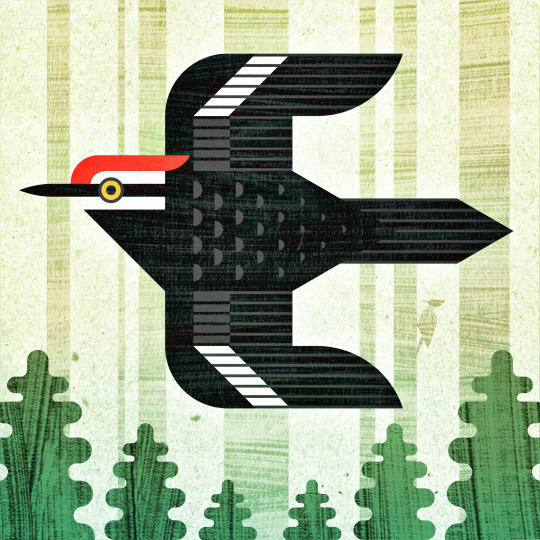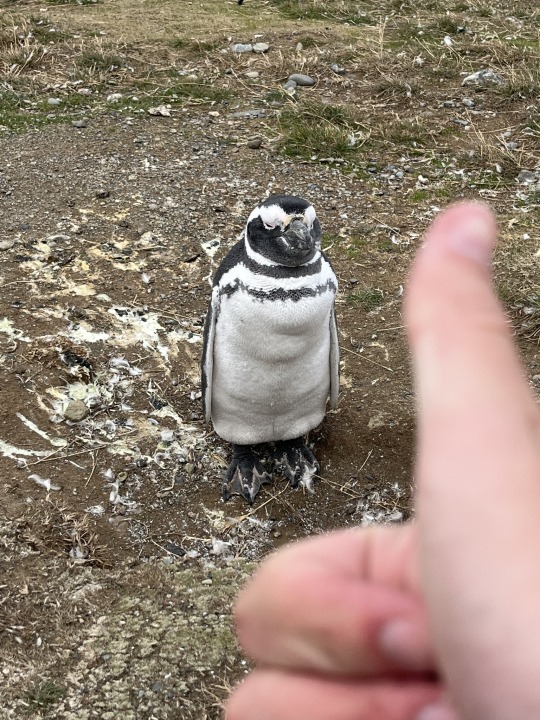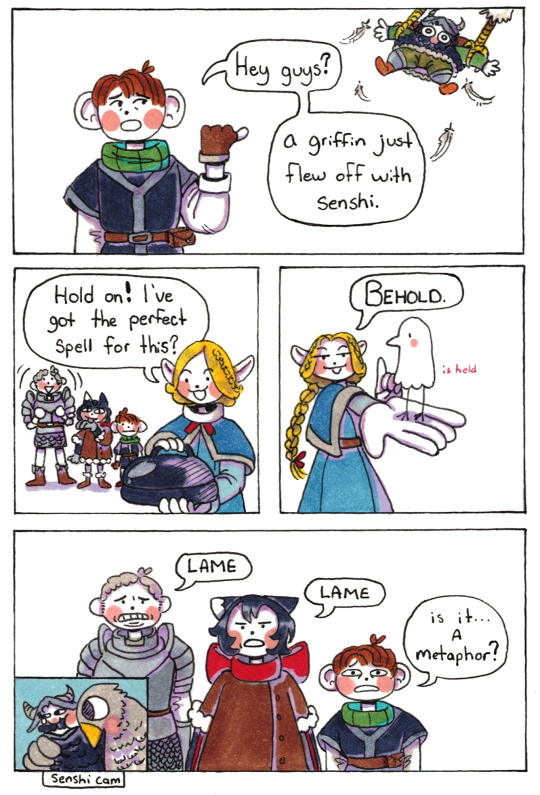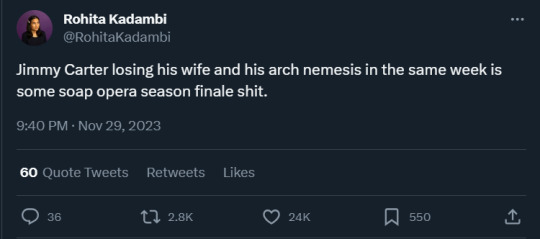#Birds of the US
Explore tagged Tumblr posts
Text
BOTD: Red-tailed Hawk

Photo: Kent Ross
"This is the most widespread and familiar large hawk in North America, bulky and broad-winged, designed for effortless soaring. An inhabitant of open country, it is commonly seen perched on roadside poles or sailing over fields and woods. Although adults usually can be recognized by the trademark reddish-brown tail, the rest of their plumage can be quite variable, especially west of the Mississippi: Western Red-tails can range from blackish to rufous-brown to nearly white."
- Audubon Field Guide
#birds#red tailed hawk#birds of north america#north american birds#hawks#raptors#birds of prey#birds of the us#birds of canada#birds of mexico#birds of central america#birds of the caribbean#birding#birdblr#birblr#bird of the day#bird watching#Buteo jamaicensis
213 notes
·
View notes
Text


#animal polls#polls#my polls#poll blog#tumblr polls#animals#nature#bird#grosbeak#birding#urban birding#north american birds#birds of the us#birds#seed-eating bird
25 notes
·
View notes
Text

It's in the eye of the beholder
#comic#birds#my art#I've had this idea for a while#after a lecture that talked about how traits we consider cute are traits found in babies#I feel like birds would have a very different definition of cute from us#anyway after making the bird tutorial I feel the pressure to draw perfect bird anatomy#but tbh I still just wing it a lot of the time!!#hehe “wing it”
62K notes
·
View notes
Text

Royal Pigeon
#artists on tumblr#pigeon#procreate#royal pigeon#bird#i think about pigeons a lot#domesticated animals#once prized possessions for their use as#communication#almost completely abandoned by humanity#painting#art#doodle#drawing#digital art#illustration
38K notes
·
View notes
Photo
Very Charley Harper inspired; I love it!
Later today, the next entry in the State Bird Initiative is going up, this time for Pennsylvania! If you're curious, check out the Introduction and the posts for Delaware (Post and Poll | Results)!

Pileated Woodpecker 2023
#bird#birds#birding#birder#bird watching#birdwatching#state bird initiative#state birds initiative#pileated woodpecker#woodpecker#picidae#piciformes#dryocopus pileatus#bird art#nature illustration#birblr#birdblr#birds of the us#birds of the united states#birds of north america
423 notes
·
View notes
Text
Planet's Fucked: What Can You Do To Help? (Long Post)
Since nobody is talking about the existential threat to the climate and the environment a second Trump term/Republican government control will cause, which to me supersedes literally every other issue, I wanted to just say my two cents, and some things you can do to help. I am a conservation biologist, whose field was hit substantially by the first Trump presidency. I study wild bees, birds, and plants.
In case anyone forgot what he did last time, he gagged scientists' ability to talk about climate change, he tried zeroing budgets for agencies like the NOAA, he attempted to gut protections in the Endangered Species Act (mainly by redefining 'take' in a way that would allow corporations to destroy habitat of imperiled species with no ramifications), he tried to do the same for the Migratory Bird Treaty Act (the law that offers official protection for native non-game birds), he sought to expand oil and coal extraction from federal protected lands, he shrunk the size of multiple national preserves, HE PULLED US OUT OF THE PARIS CLIMATE AGREEMENT, and more.
We are at a crucial tipping point in being able to slow the pace of climate change, where we decide what emissions scenario we will operate at, with existential consequences for both the environment and people. We are also in the middle of the Sixth Mass Extinction, with the rate of species extinctions far surpassing background rates due completely to human actions. What we do now will determine the fate of the environment for hundreds or thousands of years - from our ability to grow key food crops (goodbye corn belt! I hated you anyway but), to the pressure on coastal communities that will face the brunt of sea level rise and intensifying extreme weather events, to desertification, ocean acidification, wildfires, melting permafrost (yay, outbreaks of deadly frozen viruses!), and a breaking down of ecosystems and ecosystem services due to continued habitat loss and species declines, especially insect declines. The fact that the environment is clearly a low priority issue despite the very real existential threat to so many people, is beyond my ability to understand. I do partly blame the public education system for offering no mandatory environmental science curriculum or any at all in most places. What it means is that it will take the support of everyone who does care to make any amount of difference in this steeply uphill battle.
There are not enough environmental scientists to solve these issues, not if public support is not on our side and the majority of the general public is either uninformed or actively hostile towards climate science (or any conservation science).
So what can you, my fellow Americans, do to help mitigate and minimize the inevitable damage that lay ahead?
I'm not going to tell you to recycle more or take shorter showers. I'll be honest, that stuff is a drop in the bucket. What does matter on the individual level is restoring and protecting habitat, reducing threats to at-risk species, reducing pesticide use, improving agricultural practices, and pushing for policy changes. Restoring CONNECTIVITY to our landscape - corridors of contiguous habitat - will make all the difference for wildlife to be able to survive a changing climate and continued human population expansion.
**Caveat that I work in the northeast with pollinators and birds so I cannot provide specific organizations for some topics, including climate change focused NGOs. Scientists on tumblr who specialize in other fields, please add your own recommended resources. **
We need two things: FUNDING and MANPOWER.
You may surprised to find that an insane amount of conservation work is carried out by volunteers. We don't ever have the funds to pay most of the people who want to help. If you really really care, consider going into a conservation-related field as a career. It's rewarding, passionate work.
At the national level, please support:
The Nature Conservancy
Xerces Society for Invertebrate Conservation
Cornell Lab of Ornithology (including eBird)
National Audubon Society
Federal Duck Stamps (you don't need to be a hunter to buy one!)
These first four work to acquire and restore critical habitat, change environmental policy, and educate the public. There is almost certainly a Nature Conservancy-owned property within driving distance of you. Xerces plays a very large role in pollinator conservation, including sustainable agriculture, native bee monitoring programs, and the Bee City/Bee Campus USA programs. The Lab of O is one of the world's leaders in bird research and conservation. Audubon focuses on bird conservation. You can get annual memberships to these organizations and receive cool swag and/or a subscription to their publications which are well worth it. You can also volunteer your time; we need thousands of volunteers to do everything from conducting wildlife surveys, invasive species removal, providing outreach programming, managing habitat/clearing trails, planting trees, you name it. Federal Duck Stamps are the major revenue for wetland conservation; hunters need to buy them to hunt waterfowl but anyone can get them to collect!
THERE ARE DEFINITELY MORE, but these are a start.
Additionally, any federal or local organizations that seek to provide support and relief to those affected by hurricanes, sea level rise, any form of coastal climate change...
At the regional level:
These are a list of topics that affect major regions of the United States. Since I do not work in most of these areas I don't feel confident recommending specific organizations, but please seek resources relating to these as they are likely major conservation issues near you.
PRAIRIE CONSERVATION & PRAIRIE POTHOLE WETLANDS
DRYING OF THE COLORADO RIVER (good overview video linked)
PROTECTION OF ESTUARIES AND SALTMARSH, ESPECIALLY IN THE DELAWARE BAY AND LONG ISLAND (and mangroves further south, everglades etc; this includes restoring LIVING SHORELINES instead of concrete storm walls; also check out the likely-soon extinction of saltmarsh sparrows)
UNDAMMING MAJOR RIVERS (not just the Colorado; restoring salmon runs, restoring historic floodplains)
NATIVE POLLINATOR DECLINES (NOT honeybees. for fuck's sake. honeybees are non-native domesticated animals. don't you DARE get honeybee hives to 'save the bees')
WILDLIFE ALONG THE SOUTHERN BORDER (support the Mission Butterfly Center!)
INVASIVE PLANT AND ANIMAL SPECIES (this is everywhere but the specifics will differ regionally, dear lord please help Hawaii)
LOSS OF WETLANDS NATIONWIDE (some states have lost over 90% of their wetlands, I'm looking at you California, Ohio, Illinois)
INDUSTRIAL AGRICULTURE, esp in the CORN BELT and CALIFORNIA - this is an issue much bigger than each of us, but we can work incrementally to promote sustainable practices and create habitat in farmland-dominated areas. Support small, local farms, especially those that use soil regenerative practices, no-till agriculture, no pesticides/Integrated Pest Management/no neonicotinoids/at least non-persistent pesticides. We need more farmers enrolling in NRCS programs to put farmland in temporary or permanent wetland easements, or to rent the land for a 30-year solar farm cycle. We've lost over 99% of our prairies to corn and soybeans. Let's not make it 100%.
INDIGENOUS LAND-BACK EFFORTS/INDIGENOUS LAND MANAGEMENT/TEK (adding this because there have been increasing efforts not just for reparations but to also allow indigenous communities to steward and manage lands either fully independently or alongside western science, and it would have great benefits for both people and the land; I know others on here could speak much more on this. Please platform indigenous voices)
HARMFUL ALGAL BLOOMS (get your neighbors to stop dumping fertilizers on their lawn next to lakes, reduce agricultural runoff)
OCEAN PLASTIC (it's not straws, it's mostly commercial fishing line/trawling equipment and microplastics)
A lot of these are interconnected. And of course not a complete list.
At the state and local level:
You probably have the most power to make change at the local level!
Support or volunteer at your local nature centers, local/state land conservancy non-profits (find out who owns&manages the preserves you like to hike at!), state fish & game dept/non-game program, local Audubon chapters (they do a LOT). Participate in a Christmas Bird Count!
Join local garden clubs, which install and maintain town plantings - encourage them to use NATIVE plants. Join a community garden!
Get your college campus or city/town certified in the Bee Campus USA/Bee City USA programs from the Xerces Society
Check out your state's official plant nursery, forest society, natural heritage program, anything that you could become a member of, get plants from, or volunteer at.
Volunteer to be part of your town's conservation commission, which makes decisions about land management and funding
Attend classes or volunteer with your land grant university's cooperative extension (including master gardener programs)
Literally any volunteer effort aimed at improving the local environment, whether that's picking up litter, pulling invasive plants, installing a local garden, planting trees in a city park, ANYTHING. make a positive change in your own sphere. learn the local issues affecting your nearby ecosystems. I guarantee some lake or river nearby is polluted
MAKE HABITAT IN YOUR COMMUNITY. Biggest thing you can do. Use plants native to your area in your yard or garden. Ditch your lawn. Don't use pesticides (including mosquito spraying, tick spraying, Roundup, etc). Don't use fertilizers that will run off into drinking water. Leave the leaves in your yard. Get your school/college to plant native gardens. Plant native trees (most trees planted in yards are not native). Remove invasive plants in your yard.
On this last point, HERE ARE EASY ONLINE RESOURCES TO FIND NATIVE PLANTS and LEARN ABOUT NATIVE GARDENING:
Xerces Society Pollinator Conservation Resource Center
Pollinator Pathway
Audubon Native Plant Finder
Homegrown National Park (and Doug Tallamy's other books)
National Wildlife Federation Native Plant Finder (clunky but somewhat helpful)
Heather Holm (for prairie/midwest/northeast)
MonarchGard w/ Benjamin Vogt (for prairie/midwest)
Native Plant Trust (northeast & mid-atlantic)
Grow Native Massachusetts (northeast)
Habitat Gardening in Central New York (northeast)
There are many more - I'm not familiar with resources for western states. Print books are your biggest friend. Happy to provide a list of those.
Lastly, you can help scientists monitor species using citizen science. Contribute to iNaturalist, eBird, Bumblebee Watch, or any number of more geographically or taxonomically targeted programs (for instance, our state has a butterfly census carried out by citizen volunteers).
In short? Get curious, get educated, get involved. Notice your local nature, find out how it's threatened, and find out who's working to protect it that you can help with. The health of the planet, including our resilience to climate change, is determined by small local efforts to maintain and restore habitat. That is how we survive this. When government funding won't come, when we're beat back at every turn trying to get policy changed, it comes down to each individual person creating a safe refuge for nature.
Thanks for reading this far. Please feel free to add your own credible resources and organizations.
#us election#climate change#united states election#resources#native plants#this took 3 hours to write so maybe don't let it flop? i know i write long posts. i know i follow scientists on here#that study birds and corals and other creatures#i realize i did not link sources/resources for everything. i encourage those more qualified to add things on. i need to go to work
18K notes
·
View notes
Text

i think of this image approximately every day of my life
Magellanic Penguin (Spheniscus magellanicus) observation by kiwikiu
#inaturalist#naturalist#nature#ecology#zoology#biology#wildlife#birds#bird#birdblr#birding#orinthology#birdwatching#penguin#penguins#i cant believe this is one of masons obs and i didnt realize until now i think of this image CONSTANTLY#like every time i use the thumbs up emoji. which is a lot#thank you mason
19K notes
·
View notes
Text
As we head into multiple viral outbreaks including potentially H5N1, I am begging people to think carefully about how they talk about these viruses. It has been exhausting since the start of COVID hearing people talk about "only people with pre existing conditions" as if that makes everything okay. I am worth something, we are worth something, our lives matter.
#please act like you believe our lives have worth too#do not fall victim to eugenics like propaganda#pandemic#covid#us politics#chronically ill#disability#h5n1#bird flu
7K notes
·
View notes
Text
Never forget that acceptance of far-right ideals (ie tradwives, terfs, casual racism) in liberal spaces is a huge part of why today’s radicalization is so widespread and unquestioned
#not birds#Us politics#I promise I’ll stop politics posting soon outside of usual environmental issues etc
8K notes
·
View notes
Text
Later today, the next entry in the State Bird Initiative is going up, this time for Pennsylvania! If you're curious, check out the Introduction and the posts for Delaware (Post and Poll | Results)!

Chestnut-sided Warbler (Setophaga pensylvanica), male, family Parulidae, order Passeriformes, Cuyahoga Valley National Park, OH, USA
photograph by Joshua Clark | NPS
#birds#warbler#wood warbler#parulidae#setophaga#passeriformes#bird#ornithology#birds of north america#birds of the us#birds of the united states#birblr#birdblr#birding#birdwatching#bird watching#birder#black birder#birdwatchers#state bird initiative#state birds initiative#setophaga pensylvanica#chestnut sided warbler
220 notes
·
View notes
Text
Gay people will be like “this is my comfort show!” And then show you the most emotionally devastating, stress-inducing, tragic piece of media you have ever witnessed
#good omens#our flag meets death#a league of their own#Heartstopper#young royals#dead poets society#fleabag#doctor who#Merlin#the last of us#what we do in the shadows#haunting of bly manor#i am not okay with this#stranger things#shadow and bone#six of crows#lady bird#yellowjackets#she ra#lockwood & co#dead boy detectives#the sandman#good will hunting
43K notes
·
View notes
Text
BOTD: White-tailed Ptarmigan

Photo: Doug Greenberg
"Far above timberline in mountains of the west lives this elusive little ptarmigan, the smallest member of the grouse family in North America. While the other ptarmigan are strictly northern, this one follows the cordillera of the high Rockies as far south as New Mexico. Easily overlooked, it may crouch motionless as hikers pass close by."
- Audubon Field Guide
#birds#white tailed ptarmigan#birds of north america#north american birds#ptarmigans#grouse#landfowl#birds of the us#birds of canada#birding#birdblr#birblr#bird watching#bird of the day#Lagopus leucura
122 notes
·
View notes
Text

Hey now, Let her cook!
#dungeon meshi#chilchuck tims#senshi#laios touden#marcille donato#izutsumi#oyasumi punpun#<- In case you are wondering what the source for the little bird guy is.#Yeah that's right. I'm back to my extremely obscure crossover BS.#Punpun is one of those series that falls under the category of 'Good! but I cannot responsibly recommend this to anyone."#If Dungeon Meshi is like a friend asking you to go on a quick errand and you accidently go on a life changing roadtrip -#Punpun is your friend asking to go on a quick errand and they pull up to the vet and tell you your dog is being put down.#Then they explode into sludge. Melting your car. You hitchhike back but the person who picked you up is an axe murderer.#I could not finish it. My friends who did say it was good. But agree it was for the best I did not finish it.#Hey speaking of tone twists...We are one episode away from one of my favourite chapters being animated!#WHO'S READY FOR THE SENSHI BACKSTORY! WHO IS READY TO CRY!#ME! I AM! I spooked my flatmate with how energetic I was this morning. I'm vibrating with energy I was not designed to contain.#I should talk about today's episode here: It was very good. I love how they animated the familiars.#And!!! Anime only people now are in the loop on the Chilchuck lore. Part 1 of many. He still contains multitudes.#They all do to be honest! If this episode told us anything it was that we still don't know these characters as well as we think!#See you guys next week. I'll be inconsolable.
15K notes
·
View notes
Text
I feel like if humans swallowed rocks like birds do to help grind up food we'd have so much fun with it.
Can just imagine all the girlies on tiktok going "I know this is a bit controversial but I honestly love using limestone as a gastrolith. Not only can you readily forage it but they are just so pretty when smoothed out after regurgitating them"
and then all the comments would be like " girl 😭 😭 calcite dissolves in stomach acid!! Just use quartz if you want a pretty gastrolith like 💀"
#hehe what would you use as gastrolith#would it be okay to use rose quartz that would be fun I think#I really wish people could swallow rocks#birds#ornithology#silly
93K notes
·
View notes
Text
"I hate when I try to identify a cool bug I found and all I see are pest control sites :("
"I saw this cool bug/bird/whatever but Idk what it is"
"I want to learn more about the animals/plants around me but Idk where to start"
"I wish I could do something to help scientists/biologists with research and conservation but Idk how"

#Not Post#Long Post#Bugblr#Birding#iNaturalist#PLEASE iNat is literally right there!!!#You can use it to ID things! You can use it to learn more about what species are around you!#You can help scientists by documenting the things around you to help track the spread of invasive species!#Scientists can see where rare/threatened/etc. species are!
9K notes
·
View notes
Text

#god: rosalynn you've lived such a long and wonderful life#what would you like me to send to your beloved husband to let him know you're being taken care of? a bird? a rainbow? a random sunbeam?#rosalynn: kill henry kissinger. he'll know I asked. :))))#jimmy carter#rosalynn carter#henry kissinger#us politics#world politics
25K notes
·
View notes